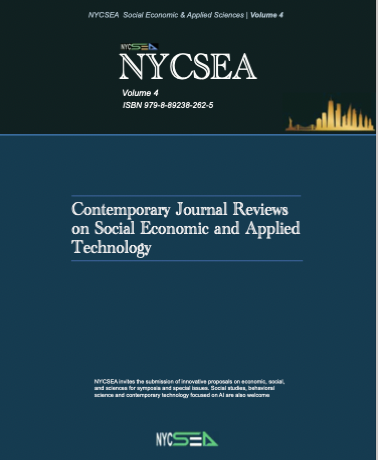We congratulate you on acceptance of your manuscript.

Abstract: Cancer plagues the human population disparately across race and sex, yet research is severely lacking in discovering biological contributors to lopsided incidence and mortality. While past studies have focused on genetic mutations, this study is the first to combine epigenetic analysis with pancreatic cancer (PC) population oncology to investigate poorly understood male and African American (AA)-specific PC incidence-- male vs female PC incidence is 5.5 per 100,000 vs 4.0 per 100,000, and AAs have up to 90% higher incidence than white patients. Data obtained from an Assay for Transposase-Accessible Chromatin using sequencing (ATAC-seq) study was computationally analyzed, and variable chromatin accessibility was demonstrated (p<.05). Y Chromosome differential accessibility analyses were subsequently performed, and significant accessibility increases were apparent in the progression to malignant tissue (p<.05), indicating an epigenetic role in increased male PC incidence. A racial analysis was then performed via KEGG pathway analysis, and driver genes of PC were found to be correlated with significantly variable methylation in AAs. This research discovered epigenetic variability correlated with 41 gene families that may contribute to higher male and AA-specific PC incidence. The discovered PC contributors can be further investigated to develop targeted therapies and population-specific screening methods, and this research methodology can be used to uncover similar contributors to population disparities in other diseases.
Keywords: pancreatic cancer (PC), population oncology, African American (AA)-specific PC incidence, racial analysis, KEGG pathway analysis
References
Ahmad, A., Azim, S., Zubair, H., Khan, M. A., Singh, S., Carter, J. E., Rocconi, R. P., & Singh, A. P. (2017). Epigenetic basis of cancer health disparities: Looking beyond genetic differences. Biochimica et biophysica acta. Reviews on cancer, 1868(1), 16–28. doi: 10.1016/j.bbcan.2017.01.001
Bale T. L. (2014). Lifetime stress experience: transgenerational epigenetics and germ cell programming. Dialogues in clinical neuroscience, 16(3), 297–305.
Cosmeri Rizzato, Daniele Campa, Nathalia Giese, et al. Pancreatic Cancer Susceptibility Loci and Their Role in Survival. PLOSone. 2011. doi: 10.1371/journal.pone.0027921
Davie K, Jacobs J, Atkins M, Potier D, Christiaens V, Halder G, et al. (2015). Discovery of Transcription Factors and Regulatory Regions Driving In Vivo Tumor Development by ATAC-seq and FAIRE-seq Open Chromatin Profiling. PLoS Genet, 11(2): e1004994. doi: 10.1371/journal.pgen.1004994
Frayling T. M. (2014). Genome-wide association studies: the good, the bad and the ugly. Clinical medicine (London, England), 14(4), 428–431. doi: 10.7861/clinmedicine.14-4-428
Freelove, R., & Walling, A. D. (2006). Pancreatic cancer: diagnosis and management. American family physician, 73(3), 485–492.
Gudsnuk, K., & Champagne, F. A. (2012). Epigenetic Influence of Stress and the Social Environment. ILAR Journal, 53(3-4), 279-288. doi:10.1093/ilar.53.3-4.279
Herceg, Z., & Paliwal, A. (2011). Epigenetic mechanisms in hepatocellular carcinoma: How environmental factors influence the epigenome. Mutation Research/Reviews in Mutation Research, 727(3), 55-61. doi: 10.1016/j.mrrev.2011.04.001
Ilic, M., & Ilic, I. (2016). Epidemiology of pancreatic cancer. World journal of gastroenterology, 22(44), 9694–9705. Doi: 10.3748/wjg.v22.i44.9694
Kamisawa, T., Wood, L. D., Itoi, T., & Takaori, K. (2016). Pancreatic cancer. The Lancet, 388(10039), 73-85. doi:10.1016/s0140-6736(16)00141-0
Kelly, T. K., De Carvalho, D. D., & Jones, P. A. (2010). Epigenetic modifications as therapeutic targets. Nature biotechnology, 28(10), 1069–1078. doi: 10.1038/nbt.1678
Khawja, S. N., Mohammed, S., Silberfein, E. J., Musher, B. L., Fisher, W. E., & Buren, G. V. (2015). Pancreatic Cancer Disparities in African Americans. Pancreas, 44(4), 522-527. doi:10.1097/mpa.0000000000000323
Klein, A.P., Wolpin, B.M., Risch, H.A. et al. Genome-wide meta-analysis identifies five new susceptibility loci for pancreatic cancer. Nat Commun 9, 556 (2018). doi:10.1038/s41467-018-02942-5
Lola Rahib, Benjamin D. Smith, Rhonda Aizenberg, et al. Projecting Cancer Incidence and Deaths to 2030: The Unexpected Burden of Thyroid, Liver, and Pancreas Cancers in the United States. Cancer Research. 2014. Doi: 10.1158/0008-5472.CAN-14-015
Marsit, C. J. (2015). Influence of environmental exposure on human epigenetic regulation. Journal of Experimental Biology, 218(1), 71-79. doi:10.1242/jeb.106971
Michael Orth, Philipp Metzger, Sabine Gerum, et al. Pancreatic ductal adenocarcinoma: biological hallmarks, current status, and future perspectives of combined modality treatment approaches. Radiation Oncology. 2018. doi:10.1186/s13014-019-1345-6
Scarton, L., Yoon, S., Oh, S., Agyare, E., Trevino, J., Han, B., Lee, E., Setiawan, V. W., Permuth, J. B., Schmittgen, T. D., Odedina, F. G., & Wilkie, D. J. (2018). Pancreatic Cancer Related Health Disparities: A Commentary. Cancers, 10(7), 235. doi:10.3390/cancers10070235
Wolpin, B., Rizzato, C., Kraft, P. et al. Genome-wide association study identifies multiple susceptibility loci for pancreatic cancer. Nat Genet 46, 994–1000 (2014) doi:10.1038/ng.3052